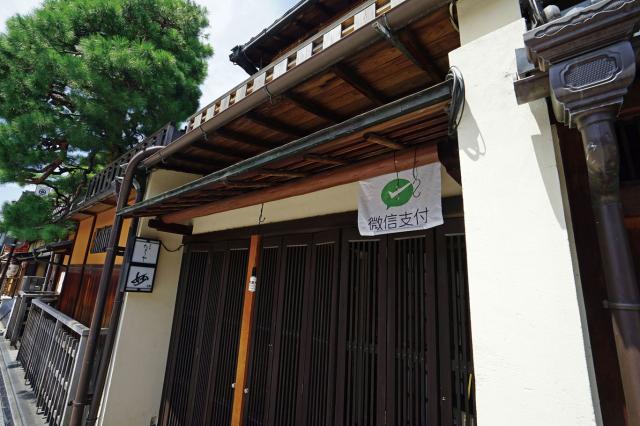Tenpay, Chinese internet giant Tencent’s payment platform, began collecting fees for its credit card repayment service five months ago. Alipay, the payment platform of e-commerce giant
Alibaba, announced recently it would increase the fees charged to stores that use its online payment settlement service. Clients of Chinese third-party platforms, either shops or consumers, have long been used to enjoying free or low cost services to settle their deals. Now it has all changed, as the platforms have found the days of making easy money are gone, due to stricter regulation.
Third-party payment platforms previously deposited clients’ reserve funds in their own bank accounts before an online transaction was finished. It was an important source of revenue for these platforms, who could earn big interest from these accounts and even profit from other investments with the funds.
No more. Starting from January 14, 2019, the People’s Bank of China (PBoC), China’s central bank, became the new custodian of all such funds and pays no interest to the platforms. As a result, the platforms will be denied access to their consumers’ reserve funds, and any profits that used to be generated from the funds. The direct connection between commercial banks and the payment platforms, which made it possible for them to circumvent the cost and scrutiny brought about by using clearance services, has also been cut. The platforms have to use the two national clearance systems to settle payments for their clients.
All this means a big squeeze in profits for payment platforms, particularly for smaller ones where reserve funds contribute to a big proportion of their income.
The change of policy will probably lead to a reshuffling of the industry, and only those who are innovative in technology, capable of restructuring the models of profit-making, and are able to provide more value-added services, will be able to weather the change.
The squeeze began two years ago. From April 2017, Chinese third-party payment platforms were asked to pool their customers’ reserve funds, which were often deposited in many different bank accounts, into a single non-interest earning bank account. The PBoC took over these centralized accounts on January 14.
NetsUnion Clearing Corporation (NUCC), a centralized clearing platform for nationwide third-party online payment, was built and put on trial in March 2017. Third-party payment platforms can choose either NetsUnion or the old national clearing service provider China UnionPay to process payments for clients.
By December 31, 2018, 99 percent of the non-bank platforms’ payments that were previously processed directly between the platforms and commercial banks had been shifted to the new centralized clearing systems operated by NUCC and China UnionPay, Wen Xinxiang, director of the PBoC’s payment and settlement department, told reporters at a press conference on January 9, 2019. This is a solid foundation for the central bank to take over the reserve funds completely, Wen said. Alipay and Tenpay, the two largest Chinese online third-party payment platforms, both declared that they have done their job in complying with the new rules.
“The platform will help China’s payment industry to develop along a healthy and orderly path. Tenpay will try its best to support the improvement of NetsUnion and together build a fair and sharing online payment clearing platform,” Lai Zhiming, vice president of Tencent, said in a statement sent to NewsChina.
The centralized deposit of the reserve funds and the disconnection of ties between non-bank payment platforms and commercial banks are directly related and part of the ongoing task of trimming internet finance risks, Wen said.
According to iResearch, a Chinese consulting company, the scale of third-party payments has
expanded from 100 billion yuan (US$14.89b) in 2011 to 58.8 trillion yuan (US$8.75t) in 2016, and it is expected to reach 229 trillion yuan (US$34.09t) in 2019.
As the market for third-party payments surged, problems popped up due to lack of regulation and supervision. “The main risk lay in that third-party payment platforms could use customer funds as they wished to make investments and for wealth management, which can lead to big trouble,” Mu Chu, an analyst from mpaypass.com.cn, a Shenzhen-based mobile payment intelligence provider, told NewsChina.
Fan Yifei, vice governor of the PBoC, pointed out at a press conference in 2017 that some institutions illegally embezzled the money, using the funds for speculation on housing and stock markets and even gambling, and if just one platform is found to have been operating improperly or fraudulently, it could involve tens of thousands of customers.
In 2014, a company based in Shanghai that issued shopping cards was discovered to have illegally embezzled consumer funds for purposes like covering daily business costs and dividend payments. It involved more than 50,000 cardholders and left 780 million yuan (US$116.13m) of consumer funds at risk. In 2016, the PBoC canceled the company’s license to provide payment services. In 2018, the central bank levied a penalty of 210 million yuan (US$31.27m) on third-party payment platforms, seven times as much as that in 2017, according to Net Credit Eye, a financing platform for peer-to-peer lending. They were accused of facilitating dubious deals, misuse of client information and breaches of rules of third-party payment platforms. Between 2011 and 2016, the central bank issued 271 licenses for third-party payment platforms. The number decreased to 238 by November 2018, with 33 canceled, according to statistics from the central bank.
Centralized management of consumer funds will improve the efficiency of clearing and safety of the reserve fund, Wen said, noting that the decision was a “major reform targeting irregularities during that period.”
Yang Tao, director of the Research Center of Payment & Settlement at the Chinese Academy of Social Sciences, told NewsChina that in the early years of their development, third-party payment institutions needed to expand rapidly. After the industry developed to a certain degree and problems began to emerge, gradually it needed to follow more strict rules, which is the trend in the industry internationally.
It was reported that payment platforms could get annual interest of three to four percent, compared with less than two percent for retail depositors, simply by putting clients’ reserve funds in commercial banks that welcome such large sums. Statistics from the PBoC show that by the end of November 2018, deposits of third-party payment platforms handed over to the PBoC had reached 1.24 trillion yuan (US$184.6b).
“Third-party payment platforms will lose an important source of profit without the reserve funds to generate interest returns from banks,” Mu said, adding that payment platforms could no longer count on clients’ reserve funds to bargain with the banks to reduce their service fees, which the banks charge for every transaction. This will further increase the payment cost.
“Handing over the deposit to the central bank and constant rising transaction fees have brought considerable cost pressure to bear,” Tenpay responded to NewsChina. “But we will continue to support the regulation of customer funds and ensure the convenient payment experience of our users.”
PBoC Vice Governor Fan Yifei said at a press conference in January that the reinforced regulation on the reserve funds will have a lower impact on big platforms like Tenpay and Alipay, but small and medium-sized institutions might find it hard to carry on without income from customer funds.
Compared to big platforms, small- and medium-sized companies rely more on their reserve fund and have limited other channels to turn a profit, Mu said. “The impact on companies depends. The more a company relies on the reserve funds to make profit, the more pain it will feel.”
Take Huifu Payment, the first payment company to list in Hong Kong. Its prospectus shows that in 2017, the interest from its customer funds was 61.6 million yuan (US$9.17m), which accounted for 46 percent of its net profit. Shares in Huifu Payment have experienced a sharp slump since it was listed in June 2018. As CMB International, an investment banking firm, explained in a research note, it is partly due to market worry over the impact of the increasing proportion of customer funds handed to the PBoC on the company’s profitability, reported the Guangdong-based newspaper Time Weekly in December.
The industry will get reshuffled as a result, Mu said. “The transformation of [third-party payment platforms] has been talked about for several years. 2019 will be a year to test whether they have succeeded in adapting to the new rules,” Mu said. “If a company fails to act to make up for the losses caused by having to hand over the reserve funds, it may be eliminated or have to merge with bigger companies.”
A driver uses WeChat to pay his highway toll fee at a toll booth in Guiyang, Guizhou Province, December 20, 2018
Big payment platforms have already started preparing for the coming winter, which is aggravated by the increasingly fierce competition in the industry.
Tencent’s financial report for the first half of 2018 said that it was in a “transitional period” and was trying to reduce the impact through the commercialization of its payment service and other finance-related services. In November 2018, Tenpay raised its service fee rate by 0.05 percent for users who transfer cash to China Minsheng Bank due to “rising fees charged by the bank.”
“It’s just the start. In the future, more and more financial services will need to be paid for. More payment institutions will start to charge,” Mu told NewsChina. “Most importantly, the payment platforms need to find other channels to make money in the future, such as expanding the market for cross-border payments and providing all kinds of services involving fintech.”
Ant Financial Services Group, an affiliate company of Alibaba that includes Alipay, is working hard to increase its income through other channels beyond payments. Reuters reported that the company planned to see its tech service replace the payment service as its largest cash cow by 2021.
By the end of 2018, 80 percent of the revenue of 1qianbao, a large third-payment platform, came from its services. The company is engaging in businesses like e-commerce, business travel and air travel, outputting its solutions to integrated financial payment demands, according to a public social media account run by newspaper the Securities Times.
In this transition period, the rapid growth and big potential in cross-border payments is expected to be a new blue ocean for the payment business, and it is driving third-party payment institutions to seize the market.
A white paper published by research firm Analysys in January shows that the transaction scale of China’s cross-border e-commerce is expected to reach 7.9 trillion yuan (US$1.2t) in 2018, an increase of 25 percent over 2017. Already, more than 30 companies, including Alipay, Tenpay and Lian Lian Pay have licenses and are putting great efforts into exploiting the market.
Providing services to small- and medium-sized business owners, companies from rural areas and public services and facilities is also seen as an area the payment platforms could further explore as a next step, according to experts who attended the 7th China Payment and Clearing Forum held in Beijing in November 2018. Firms will need to explore new and diverse ways of making money, or they will not survive.
“Payment platforms that previously mainly relied on interest from customer funds need to raise their sense of crisis and be able to use fintech to hasten their business transformation and keep and expand their customer groups to realize sustainable development in the fierce competition,” PBoC Vice Governor Fan Yifei said at the forum.

 Old Version
Old Version

